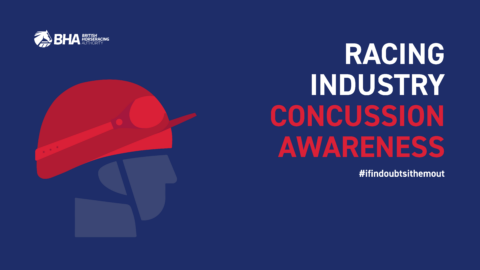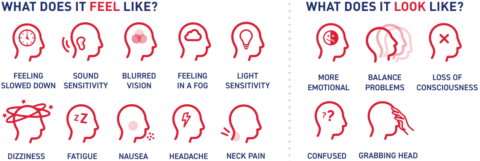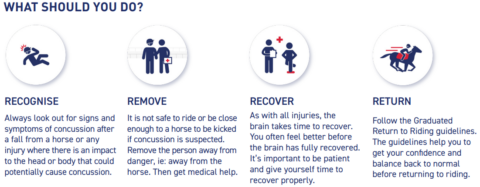This webpage provides useful information about concussion, including how to recognise and manage suspected concussions.
British horseracing has for many years been recognised as being at the forefront of concussion diagnosis, treatment and management.
Concussion is the third most common injury for jockeys, and the BHA has robust protocols in place to ensure the highest standards of care and attention for our licensed riders and dedicated rehabilitation support provided by the Injured Jockeys Fund.
Given the high-risk nature of our sport, we take concussion very seriously and are committed to continually improving our protocols, so they remain amongst the most comprehensive and rigorous in world sport.
However, concussion can happen to anyone working with or around horses, whether that is on the racecourse, riding out on the gallops or even in the training yard.
It is therefore important that everyone involved in British racing has good knowledge of what concussion is, understands what signs and symptoms to look out for, and know what steps to take to reduce the risk of long-term injury.
Concussion Awareness Course
British racing has developed an e-learning module to help spot the signs of concussion and manage recovery. The course is available to complete for free on Racing2Learn by clicking the image below.

What is concussion?
Concussion is an injury to the brain that can occur after falling from a horse or after any impact to the head or body. It is the third most common injury for jockeys, but can happen to anyone in racing at any time – on the racecourse, riding out on the gallops or even in the training yard. Concussion can cause a wide variety of symptoms, such as:

What to do after suffering concussion?
Licensed jockeys
All GB Licensed Riders (professional and amateur) are supported by extensive return to race riding protocols after suffering concussion, which are managed by the BHA Medical Department in partnership with the Injured Jockeys Fund (IJF). These involve specialised assessment and rehabilitation services which are tailored to each jockey.
Following a concussion, jockeys will be stood down for a minimum of seven full days, with recovery managed on an individual basis and return to race riding subject to clearance from the BHA Medical Department.
Racing staff, or riders without a licence
Racing staff and riders without a current GB jockey licence are supported by guidance to help ensure a safe return to work following a diagnosed or suspected concussion injury.
If concussion is suspected following a fall or impact to the head of body, there are four steps you should take:
• Recognise
• Remove
• Recover
• Return:

The Graduated Return to Riding guidelines, as listed at the ‘Return’ stage, has been developed by medical experts and racing professionals in line with UK Government’s grassroots sport guidelines. It recommends having a short period of relative rest and reduced screen time in the first 24-48 hours following a concussion. This should be followed by a graduated return to activity as detailed in the guidelines. If symptoms don’t start to settle, seek medical support via NHS 111 or a GP.
It also advises against riding or any tasks that may result in another head impact or injury for a minimum of 21 full days following concussion before the brain has had time to recover.
British racing has produced a concussion awareness learning module aimed to help those working with and around horses spot the signs of concussion and safely manage their recovery following a heady injury. The module, available on Racing2Learn, is free to take and we would encourage anyone working with horses to complete the course.
